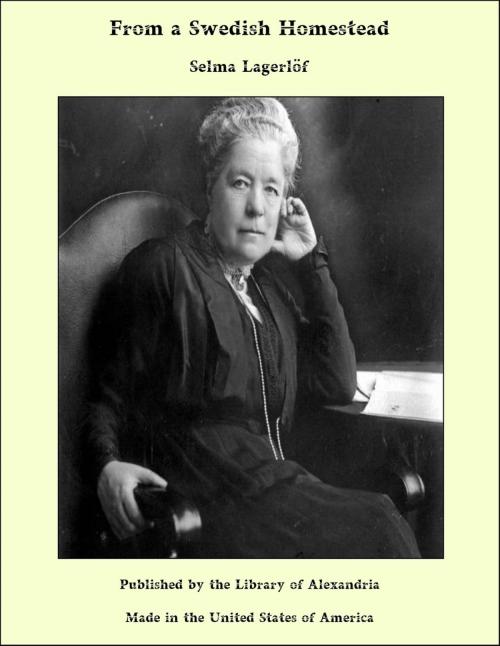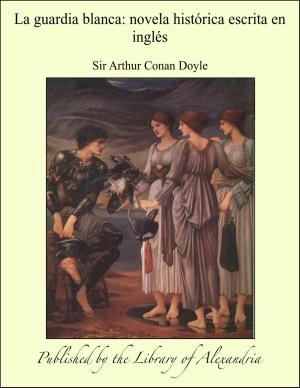From a Swedish Homestead
Nonfiction, Religion & Spirituality, New Age, History, Fiction & Literature| Author: | Selma Lagerlöf | ISBN: | 9781465607515 |
| Publisher: | Library of Alexandria | Publication: | March 8, 2015 |
| Imprint: | Language: | English |
| Author: | Selma Lagerlöf |
| ISBN: | 9781465607515 |
| Publisher: | Library of Alexandria |
| Publication: | March 8, 2015 |
| Imprint: | |
| Language: | English |
At Santa Caterina's house in Siena, on a day towards the end of April, in the week when her fête is being celebrated, people come to the old house in the Street of the Dyers, to the house with the pretty loggia and with the many small chambers, which have now been converted into chapels and sanctuaries, bringing bouquets of white lilies; and the rooms are fragrant with incense and violets. Walking through these rooms, one cannot help thinking that it is just as if she were dead yesterday, as if all those who go in and out of her home to-day had seen and known her. But, on the other hand, no one could really think that she had died recently, for then there would be more grief and tears, and not only a quiet sense of loss. It is more as if a beloved daughter had been recently married, and had left the parental home. Look only at the nearest houses. The old walls are still decorated as if for a fête. And in her own home garlands of flowers are still hanging beneath the portico and loggia, green leaves are strewn on the staircase and the doorstep, and large bouquets of flowers fill the rooms with their scent. She cannot possibly have been dead five hundred years. It looks much more as if she had celebrated her marriage, and had gone away to a country from which she would not return for many years, perhaps never. Are not the houses decorated with nothing but red table-cloths, red trappings, and red silken banners, and are there not stuck red-paper roses in the dark garlands of oak-leaves? and the hangings over the doors and the windows, are they not red with golden fringes? Can one imagine anything more cheerful? And notice how the old women go about in the house and examine her small belongings. It is as if they had seen her wear that very veil and that very shirt of hair. They inspect the room in which she lived, and point to the bedstead and the packets of letters, and they tell how at first she could not at all learn to write, but that it came to her all at once without her having learnt it. And only look at her writing—how good and distinct! And then they point to the little bottle she used to carry at her belt, so as always to have a little medicine at hand in case she met a sick person, and they utter a blessing over the old lantern she held in her hand when she went and visited the sick in the long weary nights. It is just as if they would say: 'Dear me—dear me! that our little Caterina Benincasa should be gone, that she will never come any more and look after us old people!' And they kiss her picture, and take a flower from the bouquets to keep as a remembrance.
At Santa Caterina's house in Siena, on a day towards the end of April, in the week when her fête is being celebrated, people come to the old house in the Street of the Dyers, to the house with the pretty loggia and with the many small chambers, which have now been converted into chapels and sanctuaries, bringing bouquets of white lilies; and the rooms are fragrant with incense and violets. Walking through these rooms, one cannot help thinking that it is just as if she were dead yesterday, as if all those who go in and out of her home to-day had seen and known her. But, on the other hand, no one could really think that she had died recently, for then there would be more grief and tears, and not only a quiet sense of loss. It is more as if a beloved daughter had been recently married, and had left the parental home. Look only at the nearest houses. The old walls are still decorated as if for a fête. And in her own home garlands of flowers are still hanging beneath the portico and loggia, green leaves are strewn on the staircase and the doorstep, and large bouquets of flowers fill the rooms with their scent. She cannot possibly have been dead five hundred years. It looks much more as if she had celebrated her marriage, and had gone away to a country from which she would not return for many years, perhaps never. Are not the houses decorated with nothing but red table-cloths, red trappings, and red silken banners, and are there not stuck red-paper roses in the dark garlands of oak-leaves? and the hangings over the doors and the windows, are they not red with golden fringes? Can one imagine anything more cheerful? And notice how the old women go about in the house and examine her small belongings. It is as if they had seen her wear that very veil and that very shirt of hair. They inspect the room in which she lived, and point to the bedstead and the packets of letters, and they tell how at first she could not at all learn to write, but that it came to her all at once without her having learnt it. And only look at her writing—how good and distinct! And then they point to the little bottle she used to carry at her belt, so as always to have a little medicine at hand in case she met a sick person, and they utter a blessing over the old lantern she held in her hand when she went and visited the sick in the long weary nights. It is just as if they would say: 'Dear me—dear me! that our little Caterina Benincasa should be gone, that she will never come any more and look after us old people!' And they kiss her picture, and take a flower from the bouquets to keep as a remembrance.















